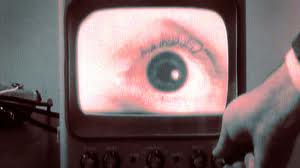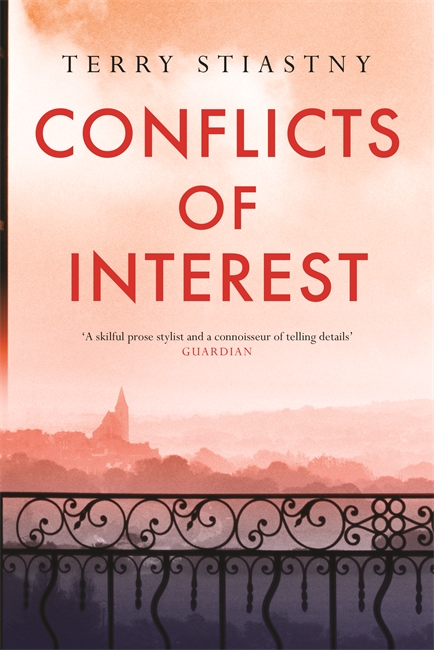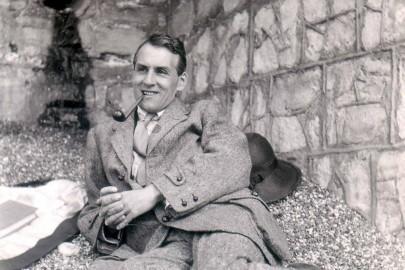The Dabbler reviews the new three-part documentary All Watched Over By Machines of Loving Grace (BBC2, 9pm Mondays).
First, we really should get one thing straight: our Western economies are being held hostage by a financial oligarchy. If you don’t believe me, read this and this (to take two separate and convincing arguments out of very many). No, they weren’t written by cranks (the former is by a former chief economist of the IMF, the latter by a respected academic economist).
However, changing the world on the basis of this insight is very difficult: there’s a lot of interest vested in ignoring and avoiding it. Yes, there are the petty corruptions – donations to political parties, politicians being given plum jobs in the financial sector, useful bankers being drafted in as policy makers and bureaucrats, etc. But there’s also a bigger, more general, dependency, in that cash-strapped governments rely more than ever on the tax receipts that pour forth from highly risky but still bonus-paying and profit-producing banks. If the banks don’t pay these taxes, we’ll have to. It’s as if we’re farming on the side of a volcano: the soil is rich, and it would be wonderful if we could haul in one more harvest before she blows again – especially as we lost nearly everything in the previous eruption…
We not only need to reform the financial sector; we also need to extricate ourselves from dependence on the bankers’ feasts before they turn to famine again. So what might be the best way to explore how we get out of this impasse?
Why not start by blaming the whole thing on Ayn Rand? Well, it has a certain simplicity. Unfortunately, it’s the sort of all-encompassing simplicity that’s not a million miles away from ‘they’re all alien lizards’ or ‘it’s that international Jewish conspiracy again’.
Such is the argument put forward by Adam Curtis’s All Watched Over By Machines of Loving Grace, making him more of a liability than an ally in this debate. Its general shoddiness is partly disguised through snappy editing and a complicated narrative: a series of largely unsupported assertions and non sequiturs are portentously intoned over a rapid succession of arresting images with a changing musical accompaniment; the sort of thing that used to be called propaganda.
A few examples (and I apologise for the length, but needs must: one of Curtis’s defences is the blizzard of assertions he flings at the viewer): Ayn Rand’s philosophy of extreme and elitist individualism is supposed to have led to computer networks where there were no hierarchies and people behaved in the words of one Californian like ‘an amoeba’ (more of a contradiction than a paradox); these self-managing networks, where each component pursues its own interests whilst still benefitting the whole, were supposedly a new, post-Randian concept (despite its earliest expression in modern times being Bernard Mandeville‘s Fable of the Bees of 1714 – not to mention the same sort of idea being elaborated on since by thinkers from Adam Smith to various relatively recent Austrians); Alan Greenspan, erstwhile Chairman of the US’s central bank, is given the entire credit for shifting Clinton rightwards (the political battles of his first term, in particular his mid-term elections, were vastly more influential); South-East Asia was supposedly re-created as a laboratory for the free flow of money in the ’90s by American politicians and disastrously impoverished as a result (from defeat in Vietnam to turning the whole region into a lab in less than twenty years! And didn’t that disastrous impoverishment turn out to be a temporary prelude to massive wealth creation?); when ‘radical Islam’ attacked the twin towers it’s argued that it was aiming at the financial power and radical individualism that they’re assumed to represent (despite this not being AQ’s own interpretation – in any event, how does the subsequent bombing of the London Tube fit with this?); some policy-makers are absurdly powerful – Greenspan, Californian tech billionaires, Robert Rubin, the Chinese Politburo – whilst others are absurdly powerless – the Presidents of the US, Indonesia, South Korea and Malaysia, Joseph Stiglitz (it all seems to depend on the demands of the story); everyone else is always and everywhere powerless and passive (except when the clips showed that they weren’t: smashing up post-’98 crash Indonesia, flying planes into buildings).
The already complicated montage of narrative and video was interpolated with clips of an interview with Ayn Rand – looking and sounding worryingly like Klaus Kinski – along with a few talking heads who knew her and who gradually related the rather pathetic details of her biography. The edit implied some sort of relevance to the ongoing story, but it really didn’t bear any examination.
Of course, there is the odd nugget of truth in here: Alan Greenspan was influenced by Rand and did make bad decisions based on what hindsight tells us was a naive belief in a new technological era (perhaps most fundamentally when he didn’t remove the partying market’s ‘punch bowl’ post-1996). But there were many non-Randians around the Fed who supported him, and millenial techno-euphoria wasn’t restricted to Randian central bankers.
I’m afraid I could go on. But I won’t – there’s such a huge quantity of gimcrack assertion, all wrapped up in rhetorical sleight-of-hand, that it would take quite some time to work through and dismantle it all. My sketchy rebuttals will have to do for now.
Anyway, back to the task outlined at the outset – how do we escape the bankers’ grip? Is there anything for us here? We’re told that financial interests look after themselves and do so quite successfully. But we knew that, and are reminded of it daily: the supremacy of financial interests can be seen at the moment most clearly in the Eurozone bail-outs, which are of banks rather than countries. But Curtis is lost here (so far, anyway): even he would struggle to ascribe the Eurozone’s problems to a reliance on the computer systems developed by Californian billionaires and the machinations of American policy-makers, all labouring under the spell of Randian ideology.
So what’s he up to? I think he gives his influences away in his presentation of how the internet’s social networks operate. They promise to free us to indulge and express our individuality. However, Curtis appears to support the idea that what’s really happening is that we’re actually ‘commodifying’ ourselves, turning ourselves into products that have a money value. Our most personal thoughts, having been turned into commodities, are sold as entertainment by ‘message boards’. We have thereby been ‘anaesthetised’, lost in the ‘spectacle’ (the only anaesthetic I’ve received from the internet has been via the contents of the bottle below – but then I would say that, this ‘message board’ being complicit in the pushing of commodities by such shadowy organisations as Ian Macleod Distillers Ltd of Edinburgh).
He returns to this idea of us as passive victims in his conclusion where he argues that a ‘Californian ideology’ inspired by Ayn Rand has turned us into ‘helpless components in a global system of rigid logic, which we are powerless to control or change’.
This is simply a regurgitation of various species of disappointed, cynical, paranoid and plain deluded late-Marxism: we are proles brainwashed by the ideologies and spectacles of so-called ‘late-capitalism’ (Curtis’s ‘we’ almost always means ‘you’ – naturally, he’s far too smart to fall for the system’s wiles.) However, testament to Curtis’s rhetorical awareness is that there is very little mention (if any?) of the word ‘capitalism’. Nevertheless, what we’re being presented with is old and very bitter red wine in an albeit fancy new bottle.
This sort of late-Marxist thought has always been self-serving: it helps explain why the much-looked-for world revolution hasn’t happened yet, the brainwashing capitalists being too clever and the light-headed proles (that’s us), too stupid. It also leads down the usual paths: given the passivity of the people surely the only route to revolutionary progress is through a great deal of prodding and pushing of these anaesthetised, helpless beasts? Shake them up a bit, why not? All done, of course, by an enlightened vanguard (of TV producers?).
We know now that when this thinking finds itself in power it invariably ends up producing some sort of gulag. One might have hoped we’d said adieu to these ideas, at least in the mainstream, but it seems not. So in one sense, Curtis has achieved something useful. He’s reminded us that, as bad as it is to be held hostage by bankers, there are worse fates in this world.













Excellent Gaw. Crisp, thought provoking and entertaining. “We not only need to reform the financial sector; we also need to extricate ourselves from dependence on the bankers’ feasts before they turn to famine again”. Surely a free bottle of Glengoyne to whoever cracks that!
Nice title, one of the longest I’ve seen for a telly show. (I didn’t see it, mind). Wouldn’t it be a finer world if all programmes had titles as lengthy as this?
The Anger of Small Families on Streets, instead of Eastenders, perhaps.
Or, instead of SpringWatch – Small Furred and Feathered Creatures What Come Into The Garden, Sometimes.
The Guessings of Erudite Youth Quartets…
okay, scraping the barrel bottom now, I know.
It sounds as if it’s the title of a Philip K Dick novel but it’s from this:
All Watched Over by Machines of Loving Grace by Richard Brautigan
I like to think (and
the sooner the better!)
of a cybernetic meadow
where mammals and computers
live together in mutually
programming harmony
like pure water
touching clear sky.
I like to think
(right now, please!)
of a cybernetic forest
filled with pines and electronics
where deer stroll peacefully
past computers
as if they were flowers
with spinning blossoms.
I like to think
(it has to be!)
of a cybernetic ecology
where we are free of our labors
and joined back to nature,
returned to our mammal
brothers and sisters,
and all watched over
by machines of loving grace.
fine review Gaw, I agree with you on all points. I assume that Curtis was attempting to ‘frame’ the hypotheses to be expounded in episodes 2 and 3 with this first film. I too found it full of ‘rhetorical sleight-of-hand’
The thing that really amazed/worried me was the idea that hyper intelligent people like A Greenspan and assorted silicone valley billionaires could use a teenager’s manifesto like Atlas Shrugged to guide their life choices. A Rand did come across as a sad soul
Despite Rand’s wild looks, I thought what she said whilst radical was quite sane. I have no desire to read her books though!
I was thinking of writing up a Dabbler review of this myself, but you have got in ahead of me and done it infinitely better than I could.
I agree with everything you say. My wife was losing her patience at my rants at the TV when I pointed out another unsupported assertion, non-sequitur and the inherent contradictions scattered all over this rather juvenile and faux-clever polemic.
Unfortunately, like his last outing, The Power of Nightmares, it will be lapped up by the sort of second-rate students from third-rate universities who swallow this conspiracy theory nonsense as if it were the answer to all the issues their lazy brains either can’t or won’t comprehend.
My reply to your comment dear Recusant.. is that it is not the second rate students we need to worry ourselves about, but the spoon fed products of hot house secondary education that go on to first class universities who still cannot string a coherent argument together if it hit them in the face. They regurgitate bollocks gleaned from quick sources such as Wikipedia, inane BBC tv programmes ( Blue Peter for the over 18’s) and throwaway comments from their spotty young tutors… all hail the conspiracy.. it is easier to blame everyone but yourself.
For the sake of domestic harmony – and because you’re right – I cannot but agree.
I’m glad we’re not the only couple to enjoy debating with the TV. My own Mrs Gaw (she won’t like that…) went to bed shortly after it started, having dismissed it far more peremptorily and pithily than I managed (“load of b****x!”).
A righteous and unerring take-down, Gaw.
I enjoyed the Rand stuff and the footage of the mass game of Pong; but then about 15 minutes in I turned to Mrs Brit (isn’t it nice that we’re getting the other halves involved in this thread) and observed: “You know, I think he’s rather oversimplifying things here…”
Overall it reminded me of a Radiohead song. A big but vague and ultimately meangingless whinge about the modern world. It was ok as a piece of video installation art about that sort of Radioheadish feeling we all sometimes get in airports and shopping malls when we’re hungry and a bit tired, but clearly twaddle in terms a coherent analysis of the 21st century. The final message is what? “Stop smiling, you ought to be more unhappy and paranoid!”
Your house sounds like a haven of civilised debate. “Yes, quite. More tea dear?”.
Have no idea whether he’s right about the financial aspect – judging by the way Gaw’s ripped him a new one, maybe not… but thought the programme itself was an interesting example of something that was editorialised in a way that a lot of non-fiction books are, especially American ones, where you’ll pick a small and seemingly distant point – an event or person with apparently little to do with the subject, and then draw some lines to show that they have.
i like the fact someone is prepared to make a programme like that, even if they’re wrong. It reminds me a bit of Nick Broomfield when he tried to prove that Kurt Cobain was murdered. It’s entertaining and interesting in its way. I mean, I would never have watched a programme like this if it was just about the economics, but the Ayn Rand stuff and the game of giant pong got me in. Rand is a brilliant villain too, the kind of person who should cause global disaster. What he should really have pointed out is that most of the geeks of the early 80s probably got into Rand through listening to Rush, who dedicated 2112 to her ‘genius’…
I suppose the importance of this sort of thing being wrong-headed depends on whether it’s taken seriously – and I’m afraid it is, judging from the odd newspaper article. I find the clumsy politics mars the entertainment value (unless you consider being wound up a sort of entertainment, which I guess it must be or blogs wouldn’t exist).
But I do like the Heavy Metal-ish (Soft Metal?) link. It’s amazing how often there is one, no matter how unlikely the topic. Now, they’re the sort of obscure linkages Curtis would be better employed pursuing.
This is simply a regurgitation of various species of disappointed, cynical, paranoid and plain deluded late-Marxism: we are proles brainwashed by the ideologies and spectacles of so-called ‘late-capitalism’
Odd that we are so easily brainwashed, yet communism was a failure for the ages.
Does my head in.
I watched The Power of Nightmares and was thoroughly irritated with what I thought were false symmetries and false patterns, accompanied by manipulative footage. I don’t know enough about finance to be able to critique the present series, but I did think the power of the computer network for individualist democracy was probably fringe group thinking – the sort of thing you’d get in Wire. As for Ayn Rand, I was glad to hear her name rhymes with “whine” rather than “pain” but about half the programme was about her personal life – showing that like other thinkers and theorists eg Tolstoy she didn’t practice what she preached.
I like the idea of the television essay, but while I was watching, I was thinking, “If I heard this on Radio 4 minus the pictures it would be pretty thin.”
Yes, the pronunciation of her name was the biggest revelation (and ‘whine’ turns out to be a surprisingly apposite rhyme!).
That’s a very good point, Rosie. The images made it interesting and unusual TV, whereas the script would have been obvious twaddle on the radio.
I’ve just watched Heath vs Wilson: The 10 Year Duel on BBC4. It’s very good – an intelligent documentary with plenty of interesting witnesses to the events and no gimmickry except for the soundtrack of pop songs of the era (which I love anyway). That’s a BBC bread and butter documentary and I vastly preferred it to the fancy cake Curtis programme. I suppose a media studies person would tell me that the manipulation to the consensus view was much more subtle than the Curtis programme.
Did exactly the same, Rosie, and can only second your view. Conspiracists might claim we were manipulated, but I was around at the time and it chimed with my memory, and when you have talking heads as diverse as Anthony Howard(RIP), Tony Benn(God help us), Jim Prior and Robert Armstrong, the consensus view might actually be the truth.
Well I was going to watch it but you saved me the bother. He gets commission’s because he tells the beeboids what they want to hear.
As for Rand she was serious gold standard economics and very much anti fractional reserve banking, and fiat money, If anything you would argue that Alan betrayed his former lover.
Its interesting that the famous former IMF Marxist got himself in the same hot water with the maid as Marx himself did…maybe there is some greater meaning to that coincidence and we need a late Marxist to tells us what it is?
This puts ‘helpless components in a global system of rigid logic, which we are powerless to control or change’ into context’:
http://www.spiegel.de/international/world/0,1518,763537,00.html
Things may not turn out as bad as people like you and Curtis reckon, Shaun!
Resources dear Garth, resources!
As for Todd, I think he is on the right lines, demographics do drive at lot of what we might call the Human story, but its the flesh on the bones that give it a narrative.
Which begs the question, why does he think that Europe is anything but dying on its feet? Unlike the US which still has a good demographic card to play, and off course we are still to see the one child policy in China play out…but then again he is a protectionist at heart like most Frenchmen.
Not sure we can generalize, but for many years India functioned ,and still does, as a plural. functioning open democracy without much need for the population to be do much more than add a fingerprint on the ballot sheet.
As for his predictions, knowing that Socialism in whatever form is inefficient and thus doomed as in the Soviet union and the Arab Socialist era that is just passing is hardly a surprise.
AQ are dying for two reason.1, .they are killing too many Muslims. 2, The US stopped by default supporting Arab National Socialism in 2003 and giving a space and recognition for alternate voice to emerge.
Its Interesting that GWB started a dialogue with opposition voices in Egypt in 2003 ,Ayman Nour in the main, and that program was halted by Barry on taking office in 2009 a little wonder he was surprised by January 25th.
But then again only this Week in Karachi, AQ attempted to seize some nuclear weapons by sending in a suicide squad to either locate said weapons and call in reinforcements or attack the base…so you pays your money and you take you chances with your opinions.
I was in Aswan only last month sampling the post revolution air and attending a wedding, I have always loved the middle east, Ive always found the desert to be a very special place. Great tine to visit too, Abu Simbel all to your self and about 30 others instead of 3000.
Succinct and superb takedown from Caitlin Moran in Saturday’s Times:
But, one episode in, I don’t know if I agree with Curtis: that we thought computers would save us, but that they have left us instead “believing that we are powerless in a system we cannot change”. Everyone I know thought that computers would be good for playing Daley Thompson’s Decathlon on, and then, later, ordering Christmas presents from Argos. I don’t think that we ever expected them to deliver Utopia. Just an inflatable mattress and three Barbie caravans.
“Believing we are powerless in a system we cannot change”, meanwhile, has been the majority of humanity’s presumption — with a few fleeting exceptions — since the beginning of time, and I don’t really see what Facebook has to do with it, to be honest.